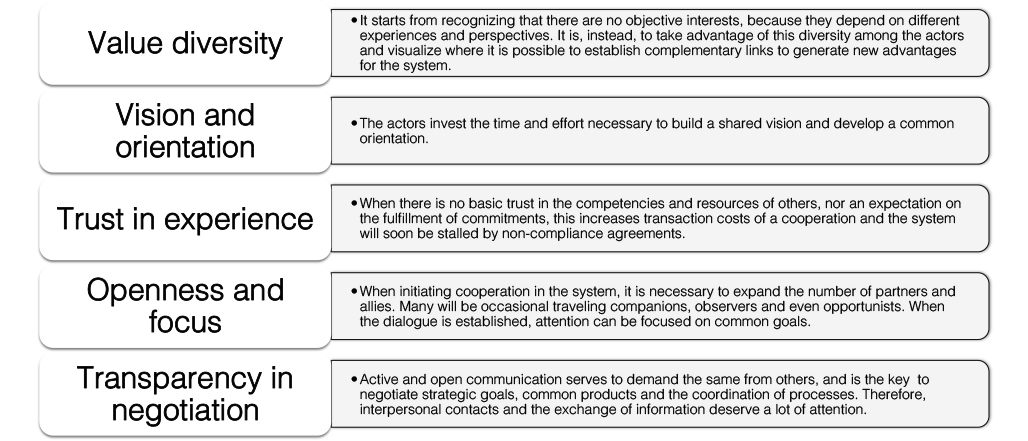

Any cooperation or collaboration, irrespective of the field, cannot be effective unless there is a willingness on the part of the actors to negotiate agreements that link them voluntarily to search for a shared solution.
To understand how the actors of a cooperation system are related, many specialists and researchers are based on social constructivism: through their interactions, the actors of the cooperation system give meaning to their perceptions, impressions, experiences and personal preferences which determines its openness to sharing resources.
In this sense, it is necessary to promote from the beginning changes in the perceptions, rules and values of the actors with respect to the cooperation system itself and to the other actors, through the promotion of initial behavior favorable to cooperation, and the strengthening of trust between actors.
At the beginning of the cooperation, the actors will share the need to improve the situation they want to intervene, and many exchanges will revolve around what can be done, but behind the scenes there will be a high degree of uncertainty and distrust about the results, the risks and benefits of cooperation, and the behavior of others.
In this module we will present those factors that can generate uncertainty and instability in a collaborative initiative, proposing aspects that work to guarantee the success of the collaboration agreements.
1. Early Stages of cooperation
 It is important to bear in mind that in this initial phase of cooperation, the productivity of the cooperation system must be demonstrated, first of all for the members of the system. Regarding this point, there are three situations at the beginning that should be avoided:
It is important to bear in mind that in this initial phase of cooperation, the productivity of the cooperation system must be demonstrated, first of all for the members of the system. Regarding this point, there are three situations at the beginning that should be avoided:
Many of the problems derived from working with partners during a cooperation could be avoided in the process of selecting partners. Some of difficulties which might arise, which should be considered include:

In this first phase, and at least during the negotiation of the structure of cooperation, it can be very useful for the cooperation system to be advised by an external entity that assumes communication and management functions, instead of giving that role to an entity of the system and generate imbalances of power in a delicate moment of agreement.
In any case, the most necessary capacities for this coordination function are:

The probability of success will increase if the protagonists in the initial phase also demonstrate a constructive behavior that fosters the consolidation of the cooperation system, characterized by:

SELF-ASSESMENT
This questionnaire will allow you to evaluate the competences acquired by studying the module.